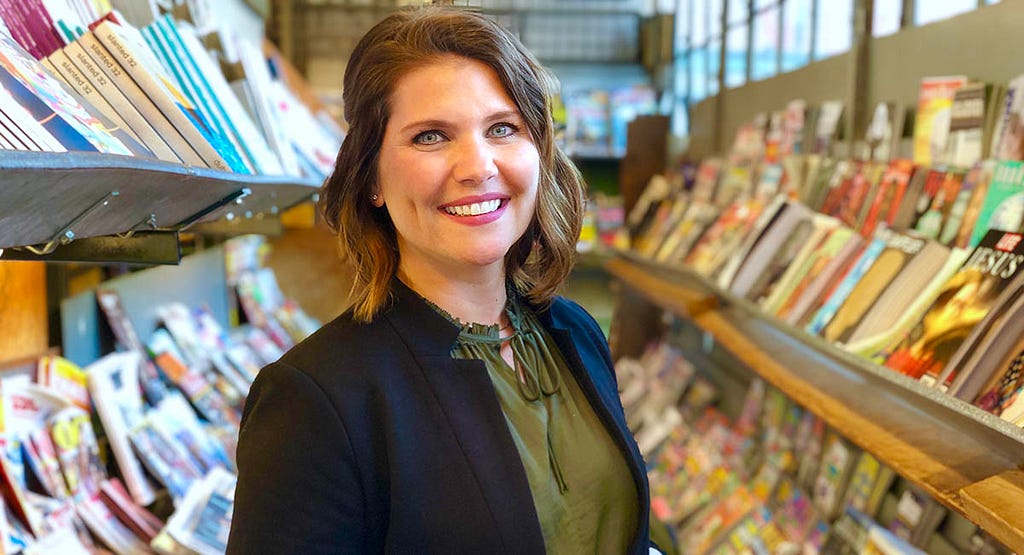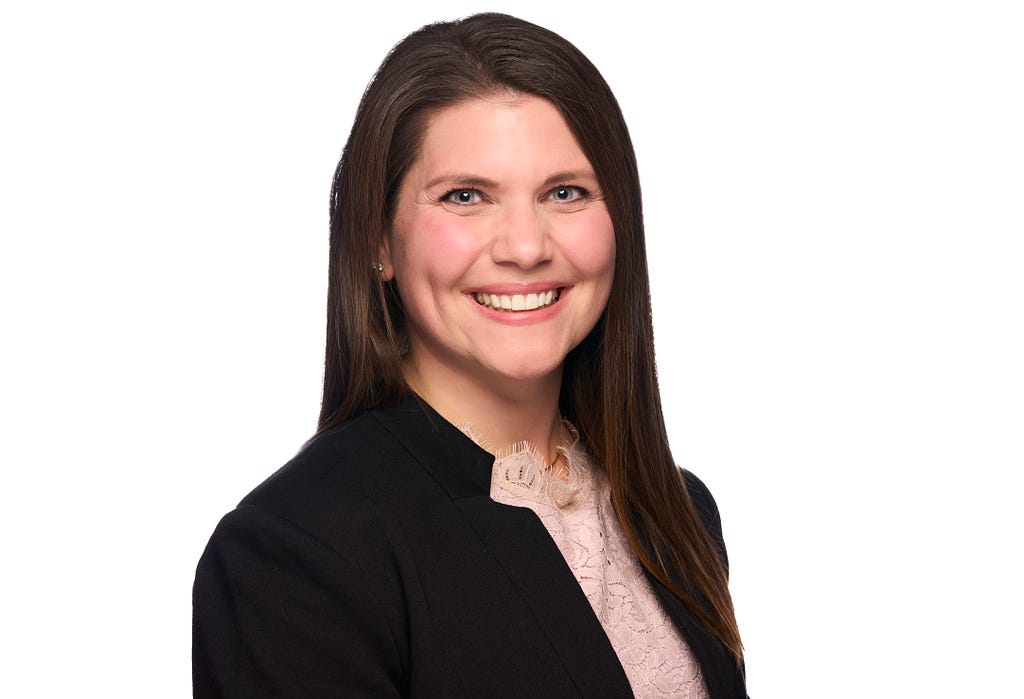PR Pros: Kara Lundberg of Raffetto Herman Strategic Communications On The 5 Things You Need To Create A Highly Successful Career As A Public Relations Pro

Creativity. A large part of PR is the ability to think strategically. PR professionals must be able to process a range of information about current events and industry trends and think creatively about how best to tell stories through various content channels. This involves out-of-the-box thinking, as well as using strategic and creative language to relay information in ways that reporters and influencers understand, and target audiences will want to read and hear.
Have you seen the show Flack? Ever think of pursuing a real-life career in PR? What does it take to succeed in PR? What are the different forms of Public Relations? Do you have to have a college degree in PR? How can you create a highly lucrative career in PR? In this interview series, called “5 Things You Need To Create A Highly Successful Career As A Public Relations Pro” we are talking to successful publicists and Public Relations pros, who can share stories and insights from their experiences.
As a part of this series I had the distinct pleasure of interviewing Kara Lundberg.
Kara Lundberg leads Raffetto Herman Strategic Communications’ healthcare and technology clients through the development and execution of PR strategies designed to meet their business goals. With more than a decade of agency experience, and a special expertise in the healthcare IT industry, Kara has an eye for identifying new communications opportunities. She pursues creative solutions for building brand awareness and thought leadership through meaningful results. Kara began her career in the technology sector at Weber Shandwick. She earned a bachelor’s degree in journalism with an emphasis in public relations from Western Washington University.
Thank you so much for your time! I know that you are a very busy person. Can you tell us a story about what brought you to this specific career path?
Since I was young, I’ve been an avid news consumer. The nightly news was always on in my house, I admired the local TV news anchors, and paging through the Sunday paper was a weekly routine. Full transparency, I was looking for the comics, but I still learned my way around a newspaper. These habits made me curious about gathering information and understanding the impact of current events.
As a college student, my intro to public speaking course grounded my passion for communications and how I could use my words to share perspectives and tell stories. It led me to the journalism and public relations major at Western Washington University in Bellingham.
Can you share the most interesting story that happened to you since you began at your company?
I joined Raffetto Herman Strategic Communications (RH Strategic) in 2010 when we were a mighty team of seven. Many of my contributions to our clients and the organization may be considered non-traditional to the typical PR agency career path. I’ve had the fortunate opportunity to learn from and work alongside our CEO and president from the beginning. Since then, I’ve experienced the dynamics of representing clients of all sizes, provided guidance in business decisions, and evolved my role from a PR professional and media engagement specialist to an executive.
Today I’m focused on client strategies and the firm’s talent development. While I’m a PR pro at my core, I am energized by networking with and recruiting individuals who deepen our perspectives on the profession and our clients’ industries. I feel empowered to share my experiences with early-career professionals and use my more than 15 years of on-the-job experience (almost 13 with RH Strategic) to coach and develop the next generation of passionate PR professionals.
Can you share a story about the funniest mistake you made when you were first starting? Can you tell us what lesson you learned from that?
We’ve all done it, the dreaded “Reply All” error. Rarely funny.
I made this mistake on an all-team email with a client copied. Fortunately, my reply-all blunder was work-appropriate and non-damaging to my client-relationship, team, or organization but it didn’t represent my high professional standards. After that, I always think twice, or three times, about using the Reply All command.
The lesson learned is crucial in PR. You need an eye for detail, the restraint to slow down, and the self-control to think before you act.
What are some of the most interesting or exciting projects you are working on now?
So much about PR is learning on the job, and that takes the support of the people around you. One of the most interesting and rewarding parts of my career is counseling. Counseling clients on PR strategies and counseling early-career colleagues who are hungry for new experiences.
Every day I’m learning something new. I always look for ways to share knowledge with people who are three months, one year, or even 10 years into their careers. It’s no secret that you learn more through hands-on experience rather than in the classroom. That’s why I believe every PR professional should take it upon themselves to mentor and coach others.
At RH Strategic, we launched a PR fellowship program committed to exactly this concept. I find it incredibly rewarding to teach and share experiences about what we do as PR professionals and why we do it.
You are a successful leader. Which three character traits do you think were most instrumental to your success? Can you please share a story or example for each?
Curiosity: In PR, it’s critical to be curious. Ask questions, ask for what you want, and ask for new opportunities and challenges. Especially early in your career, ask people why they did something a certain way. Understand the why and reason behind edits, best practices, client counsel and beyond. This is all foundational for becoming an exceptional professional in the communications field.
Personable: In my first PR job out of college, I worked for a large global firm in Seattle. I was new to the company and the working world, and I made a goal of knowing everyone in that office. I’ve been that way my whole life: look someone in the eyes, shake their hands and acknowledge how they fit in with the working environment around me. Throughout all aspects of PR — pitching, client relations, teamwork — it’s important to remember that everyone is someone. They’re not just a coworker or client, they are a person with whom you should get to know. Being friendly and personable in this sense strengthens your ability to connect with others in the field.
Responsible: I’ve always taken ownership of my work, whether it’s a small one-off project or standing up new strategic programs and initiatives. If you want to establish your working persona as a responsible and reliable contributor, you must stay accountable to given or chosen deadlines and communicate with your teams and colleagues.
For the benefit of our readers, can you help articulate what the different forms of PR are?
According to the Public Relations Society of America, PR is “a strategic communication process that builds mutually beneficial relationships between organizations and their publics.” Many people think a career in PR is all about spinning the news or hosting flashy events. However, it’s much more than that. By implementing PR solutions for paid, earned, shared and owned media channels, PR professionals coordinate and/or produce high-quality content to reach a target audience and support business objectives.
PR professionals working in agencies typically represent multiple brands or “accounts,” meaning they contribute to the communications and public awareness strategy for multiple companies at once.
At RH Strategic, we see ourselves as strategic counselors, creative partners and communicators. We design PR campaigns that prioritize strategy, creativity and efficiency to help our clients achieve meaningful business objectives. The companies we partner with are innovative companies that are disrupting the market and challenging the status quo to make a difference.
Where should a young person considering a career in PR start their education? Should they get a degree in communications? A degree in journalism? Can you explain what you mean?
For those who enjoy consuming media, communicating creatively and effectively, and building relationships, PR may be an excellent career choice. While a degree in communications or PR is highly encouraged, it is not necessarily a requirement. There are many transferrable skills for folks looking to make a career switch later in life.
For aspiring PR professionals, we encourage gaining experience through internships and fellowships. Many PR firms offer these opportunities for college students and recent graduates. For example, RH Strategic’s fellowship program provides an immersive learning experience for graduates. We assign fellows to account teams, engage them in on-the-job training, give them ownership over projects, offer mentoring, and host weekly workshops to foster intensive learning and collaboration across the fellowship cohort.

You are known as a master networker. Can you share some tips on great networking?
Building relationships is at the core of PR and it is one of my favorite aspects of the career. In my role, I enjoy building personal connections with my clients beyond just discussing status updates and next steps. I do this by unapologetically being myself. I share about personal experiences, give information I have about related (and, when appropriate, random) subject matter, and try to follow up with clients, colleagues and those in my network when I hear or see something that reminds me of them (including milestones, birthdays, etc.). Anyone can read a room and be professional, but being friendly, empathetic and human with your network is the best way to create two-way trust and better collaboration.
Lead generation is one of the most important aspects of any business. Can you share some of the strategies you use to generate good, qualified leads?
Like most aspects of PR, successful lead generation comes back to building and maintaining solid relationships. In the early days of the company when I joined, this was our hallmark for business development. As we grew, we developed our content marketing and SEO capabilities to make it easier for companies to discover us. Today, we strive for a balanced approach of tapping our existing network and attracting inquiries from those who don’t know us. Regardless of how a prospect comes into our orbit, we focus on nurturing those relationships and staying connected — you never know where the next big opportunity may arise.
Based on your opinion and experience, what are “5 Things You Need To Create A Highly Successful Career As A Public Relations Pro” and why. (Please share a story or example for each.)
Creativity. A large part of PR is the ability to think strategically. PR professionals must be able to process a range of information about current events and industry trends and think creatively about how best to tell stories through various content channels. This involves out-of-the-box thinking, as well as using strategic and creative language to relay information in ways that reporters and influencers understand, and target audiences will want to read and hear.
Persistence. PR professionals get told “no” or something like it a lot. Members of the media don’t see every pitch and they ignore calls when on deadline. Clients and communications executives often push back on message framing, request substantial edits or leave out critical information that could have informed a well-integrated PR strategy. Ask questions, ask for feedback, follow up and do your research. For many agency PR pros, you’re the media expert in the partnership. You know what’s driving the news cycle and how reporters and editors will react to different kinds of experts, announcements and statements. Be prepared to inform, adjust and stick with it.
Empathy. PR professionals are often ranked near the top of the “most stressful jobs” lists, yet we are often described as miracle workers, rockstars and heroes with words. While we’re certainly not heroically rescuing people (or pets!) or performing life-saving procedures, this career does come with stressful moments. Having empathy for your colleagues, clients, partners, media contacts, vendors and even the janitors in the building where you work, fosters a collaborative, open and enjoyable work environment. Having empathy for those in your professional circle makes every day just a little less stressful and leaves an opening for understanding what people are managing outside of deadlines, emails, reports and pitches.
Confidence. At the end of the day (and frankly, the beginning too), our clients hired us to do a job based on our expertise in the communications field. Our clients seek our input on communication strategies spanning external audiences (media, stakeholders, influencers) and internal audiences (employees, partners, executive boards). Having confidence is paramount to building trust and becoming an invaluable member of their in-house team.
Adaptability. By nature, PR is a fast-paced environment. Successful contributors think on their feet, know that circumstances are constantly changing, acknowledge that ideas are meant to be expanded upon, and always leave room for the unexpected. Having an adaptable mindset helps with the stress of the job but is also a good reminder that we can always return to what is unfinished if interrupted. If this does not come naturally to you, surround yourself with and learn from team members who always have their heads up and are ready for a shift in the wind.
Because of the role you play, you are a person of great influence. If you could inspire a movement that would bring the most amount of good to the most amount of people, what would that be?
In a perfect world, our nation’s healthcare system would be magically fixed. I know I’m not alone with this wish. Regardless of class, geography, gender or means, everyone in this world would understand how to access and get better healthcare. It should not be something that bankrupts people or causes more confusion and harm than good. People should be able to access affordable and supportive care for a scrape from the playground to their end-of-life care, and everything in between. And I mean everything.
That is why I like working on behalf of healthcare innovators with inspiring missions. I’m fortunate to represent organizations that are working incredibly hard to make healthcare more effective, easier to understand and reachable. And we’ll get there. Some day.
This was really meaningful! Thank you so much for your time.
PR Pros: Kara Lundberg of Raffetto Herman Strategic Communications On The 5 Things You Need To… was originally published in Authority Magazine on Medium, where people are continuing the conversation by highlighting and responding to this story.
